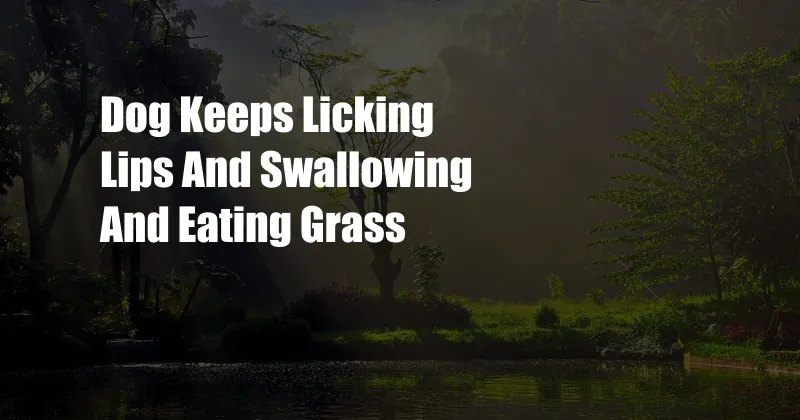
Dog Keeps Licking Lips and Swallowing and Eating Grass: A Comprehensive Guide
Have you ever witnessed your furry friend repetitively licking their lips, swallowing excessively, and munching on grass? While these behaviors may seem harmless at first, they could indicate underlying health concerns or discomfort in your dog. Join us as we delve into the possible reasons behind these actions and explore the best ways to address them.
Understanding the Causes of Lip Licking, Swallowing, and Grass Eating
Nausea or Stomach Issues
Lip licking and swallowing are common signs of nausea or stomach discomfort in dogs. They may experience an upset stomach due to various reasons, including indigestion, dietary changes, or eating something they shouldn’t have. Grass eating can also be a way for dogs to self-medicate and soothe their digestive system.
Allergies or Irritants
Allergies and irritants can trigger lip licking, swallowing, and grass eating in dogs. Environmental allergens, such as pollen or dust, can cause itchiness and irritation in the mouth and throat, leading to excessive licking and swallowing. Grass eating may provide temporary relief from the discomfort.
Anxiety or Stress
Dogs can exhibit repetitive behaviors like lip licking and grass eating when they feel anxious or stressed. These behaviors serve as a coping mechanism for managing their emotions. Identifying the source of your dog’s anxiety and providing a calming environment can help reduce these behaviors.
Dental Problems
Dental issues, such as pain or discomfort in the mouth, can also cause lip licking and swallowing. If your dog has a loose or aching tooth, they may lick their lips excessively or try to soothe the pain by chewing on grass.
Other Underlying Conditions
In rare cases, lip licking, swallowing, and grass eating can be symptoms of more serious underlying medical conditions, such as liver disease or neurological disorders. If you notice these behaviors persist or are accompanied by other symptoms, it’s essential to consult your veterinarian for proper diagnosis and treatment.
Tips and Expert Advice for Addressing Lip Licking, Swallowing, and Grass Eating
To address your dog’s lip licking, swallowing, and grass eating, consider the following tips:
Monitor Your Dog’s Behavior
Keep a close eye on your dog’s behavior to determine if there are specific triggers or patterns associated with these actions. Identifying the underlying cause can help you develop effective solutions.
Adjust Your Dog’s Diet
If you suspect stomach issues or allergies, consider adjusting your dog’s diet. Consult with your veterinarian to determine the best diet for your pet’s specific needs. Introducing new foods gradually can help minimize digestive upset.
Reduce Anxiety or Stress
Create a calming and comfortable environment for your dog to reduce anxiety or stress. Provide plenty of exercise, mental stimulation, and affection. Consider using calming aids like pheromone diffusers or anxiety vests.
Address Dental Problems
Regular dental check-ups are crucial for maintaining your dog’s oral health. If lip licking and swallowing are associated with dental pain, consult with your veterinarian for professional dental cleaning or treatment.
Seek Veterinary Advice
If lip licking, swallowing, and grass eating persist or are accompanied by other symptoms, don’t hesitate to seek veterinary advice. Your veterinarian can perform a comprehensive examination to rule out any underlying medical conditions and recommend appropriate treatment.
Frequently Asked Questions (FAQs) on Lip Licking, Swallowing, and Grass Eating in Dogs
Q: Is it normal for dogs to lick their lips occasionally?
A: Yes, occasional lip licking is normal behavior for dogs. However, excessive or persistent lip licking may indicate underlying issues.
Q: Why do dogs swallow so much?
A: Dogs may swallow excessively to soothe stomach discomfort, relieve nausea, or ingest something they shouldn’t have.
Q: Is it harmful for dogs to eat grass?
A: Eating grass occasionally is not typically harmful to dogs. However, excessive grass eating may indicate digestive issues or the presence of parasites.
Q: How can I stop my dog from eating grass?
A: Identify the underlying cause of your dog’s grass eating and address it accordingly. Provide a healthy diet, reduce anxiety, and discourage grazing by providing alternative activities.
Q: When should I consult a veterinarian about lip licking, swallowing, or grass eating in my dog?
A: Seek veterinary attention if these behaviors persist or are accompanied by other symptoms, such as vomiting, diarrhea, loss of appetite, or lethargy.
Conclusion
Understanding the reasons behind your dog’s lip licking, swallowing, and grass eating is crucial for their health and well-being. By following the tips and expert advice in this guide, you can help address these behaviors and ensure your furry friend lives a happy and comfortable life. Remember to monitor your dog’s behavior, consult with your veterinarian when necessary, and take proactive steps to provide a supportive and healthy environment for your beloved companion.
Are you interested in learning more about dog behavior and health topics? Explore our blog for a wealth of informative articles and resources to deepen your understanding and enhance the bond with your canine friend.